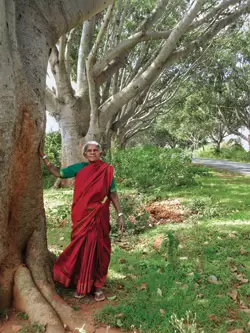A woman plants and nurtures 284 banyan trees between Kudur and Hulikal
18-August-2011
Vol 2 | Issue 33
Eighty-year-old Saalumarada Timmakka is a mother of 284. Her children aren’t flesh and blood creatures but gigantic banyan trees. It was with her own hands that she planted and nurtured these trees that flank a four-km stretch of a public road between Kudur and Hulikal villages in Karnataka’s Ramanagara district.
In her younger days, the unlettered Timmakka, a Hulikal native, worked in a stone quarry. She married a cattle herder Chikkaiah but could not bear him a child. She transferred her natural maternal instincts to the trees that she reared with love and care with the help of her husband.
 |
|
Gritty woman: Saalumarada Timmakka and her husband Chikkaiah planted and nurtured the banyan saplings till they grew up flanking the 4km Kudur – Hulikal road (Photo: The Sunday Indian)
|
“My husband’s relatives put pressure on him to abandon me and remarry so that he could a raise a family,” Timmakka reveals. But the illiterate Chikkaiah would have none of it.
Probably as a means to strengthening their bond, the couple turned their attention to the task of tree-planting. She chose a dry stretch between their village and Kudur. It did not have a single tree and walking between the two villages on a hot summer day was an ordeal.
Timmakka and Chikkaiah obviously did not plant all the 284 trees in one go. It was a long painstaking process that took all of ten years. While the other villagers would focus on agricultural activities in the months before and during monsoon, the couple would go about planting banyan trees. Every year, they planted a minimum of 20 new plants until they had finally covered the entire four-km stretch.
Planting the trees was only the first step. Tending to and nurturing the saplings was the tough part. It called for hard work and a fair amount of money. The impoverished couple spent their hard earned money to maintain the plants. The plants had to be watered every day, especially during the summer months, until the roots were firm enough. They had to be watered every three days for a year and later every week until they were strong enough to grow on their own.
Timmakka and Chikkaiah would set out every morning to water the plants in summer, the woman with a pot on her head and another on her hip and the husband with a load of two pots hanging from the ends of a pole balanced over his shoulder.
Water was scarce in the area back then and it was a struggle to get enough even for domestic use. Yet the indefatigable couple managed a supply of an average 50 pots of water a day for their ‘children’.
They filled the pots from wells and ponds that were four to five km apart. To protect the plants from grazing cattle, they erected a fence around each of them. Chikkaiah kept vigil on the saplings. He patrolled the stretch, shooing away wandering cattle. Timmakka worked as a daily wage labourer to take care of the couple’s frugal daily needs.
The banyan trees have now grown tall on both sides and their huge branches have formed leafy arches over the road. They bear mute testimony to the amazing spirit of a remarkable couple. Today, a walk down the road is exactly as Timmakka and Chikkaiah had foreseen: a green activist’s delight.
Their effort assumes greater significance when it dawns on you that they realised their dream entirely on their own, without seeking any external assistance, either from the government, NGOs or individuals. Neither did the couple ever seek any attention for their work. But yes, many national and international awards and recognitions did come their way.
Chikkaiah passed away in 1991, but Timmakka still has her 284 children by her side. Two decades later, this mother of all green crusades still casts its pleasant shadow all along an otherwise nondescript rural road.
Published by special arrangement with The Sunday Indian















